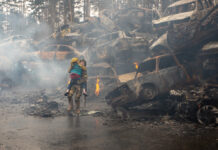This week on MIA Radio we share what is something of an anniversary for us at MIA. This interview marks one hundred episodes since we launched our podcast in July 2017. And for this episode, we interview David Joslin. David is a retired army medic, having been deployed to Iraq in 2003 and Afghanistan in 2008. David currently works as a senior healthcare administrator and he has co-founded Remedy Alpine, a Veterans therapeutic recreation non-profit dedicated to providing wilderness therapy adventures in Alaska.
David has also written for Mad in America, publishing Broken Is Not All I’ll Ever Be in August 2019 and he has recently launched a new podcast called Bullets to Beans, which is a military and Veteran-centric podcast focused on current military and Veteran topics, blended with discussions on mountain-oriented recreational and adventure-based therapy programs.
We discuss:
- How upon leaving the military, David felt that he had lost his identity, suddenly working in private healthcare and not being able to care directly for colleagues as he had as a combat medic.
- That to help deal with the change, David started going out into the Alaskan backcountry wilderness to find peace and healing.
- How this interest led him to meet Eric Collier, a like-minded Veteran interested in wilderness hiking.
- How David and Eric saw the benefits to be had in sharing wilderness adventure experiences and launching their first event for Veterans in 2017.
- David and Eric then took the time to establish themselves as a business during the Winter of 2018.
- During 2019, David and Eric led 49 veterans into the Alaskan wilderness and connected with 150 veterans via outreach and community enrichment events.
- That David came to see that many veterans attending the wilderness therapy program had struggled with multiple medications prescribed during their service years.
- How David’s experiences within the military led to treatment for post-traumatic stress disorder, resulting in being prescribed a drug cocktail.
- How the initial drugs were followed by others for insomnia, for nightmares, blood pressure problems and for focus and concentration.
- How at the height of David’s ‘better living through chemistry’ he was on 13 different drugs.
- That through David’s pharmacological training, he realised that one of the top ten side effects of many of the drugs he had been put on was suicidal thinking.
- How David came to suddenly take himself off all his drugs and strongly advises others never to do this themselves.
- That it was planning his own suicide that brought him to face that his life was unsustainable, accepting that he didn’t want to live as he had been.
- As he was planning it, he found that he didn’t want to suffer and found that he did want to live, realising that the suicidal thoughts were very likely as a result of treatment.
- That during his service years, David had assisted with at least three suicide interventions and that caused him to consider what might be driving Veterans to consider suicide.
- How having confronted his suicidal thoughts and coming off his drugs, David then went on to find solace and comfort in wilderness adventures.
- That David still sometimes struggles with nightmares, hyper-vigilance and social anxiety but that he could deal with this without feeling numbed by the drugs and by being away from society but with trusted colleagues and friends in an environment conducive to healing.
- That Remedy Alpine is now starting to work as a government contractor to provide recreationally-based programs to the Veteran community.
- How Remedy Alpine operates year-round and provides single-day hikes, single overnight camping events and multi-day hikes which can range from 26 to 30 miles through the Alaskan mountains.
- The recent launch of the Bullets 2 Beans podcast which focuses on post-military life challenges.
- That Remedy Alpine attended the Nature’s Grace Conference, which focussed on America’s veterans and the healing power of nature.
- How Remedy Alpine is now focussed on expanding the business side, applying for grants, developing therapeutic programs and training Veteran peer mentors.















“That through David’s pharmacological training, he realised that one of the top ten side effects of many of the drugs he had been put on was suicidal thinking.”
I’ve just been reading an article by Dr Hickey and he makes the following statement
“In the 2016 US legislative session, the late Senator John McCain and Congressman David Jolly introduced bills in their respective chambers which mandated post-mortem screenings for psychiatric drugs in all veterans who died by suicide. The bills, which were not supported by psychiatry, failed. Now why in the world would psychiatry not support such measures? Why is psychiatry not actively pushing for the reintroduction of these or similar bills today? ”
I find myself wondering too. Is this something that veterans would support? I personally would like to get to the bottom of whether these drugs are doing more harm than good. Anyhow, i’ll do my best to come back to the podcast when I can.
Report comment
“By their fruits shall ye know them.” Indeed, it is easy to see where they are coming from by their vicious opposition to any attempt to look at the actual consequences of their policies and “treatments.”
Report comment
So *Remedy Alpine is like to look at the bright image on the monitor in the dark time. Like a contrast shower.
Interesting what David thinks about so-called fast oneiroid state, when catatonic behavior manifests..
Report comment
Thanks Derek and David,
“the potential” for something to go wrong, while on these chemicals, and how it might have been a different outcome if even one thing, one experience had been different.
It is unforgivable that these chemicals are thrown at people that are responsible for lives, whether parent or soldier. These are not missiles that seek out the feeling or thought. They just nuke willy nilly.
We are fighting the war of false information, the bogus practices of psychiatry, and David is a strong voice to hear.
Obviously all the people speaking out against psychiatry are not doing it because of some teenage anarchy ideal.
People can believe in psychiatry if they want to, but beliefs change and often through experiences.
If I read about cancer treatments hurting people, if I read about abuses through those treatments, I would certainly pay attention, and obviously I would not believe the cancer specialists ‘evidence’, because people’s experiences, the ‘anecdotal’ ones have meaning, and to top it off, there are stats and research to support what we say.
I am glad that David realized something was more off than need be, and doing things that call to him.
Report comment
https://www.youtube.com/watch?v=OziqRm6Hc4E
This is important info for veterans, or anyone. In the presence of psychiatry and a lot of psychology or therapy, we remain drawn into falsities, just as one does in war.
War is never our story, we get drawn into someone elses story, and suffer the consequences. Reconciliation is never doable, unless the fib tellers admit their lies.
Report comment